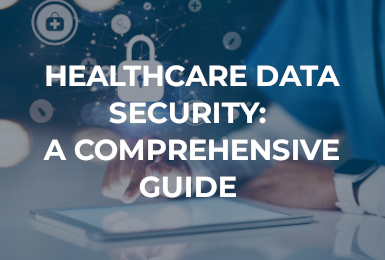Given the growth of the healthcare field in recent years - which can largely be attributed to an aging population whose care needs must be met - and the high salaries associated with healthcare administration jobs, many people are now considering a career in the field.
If you've researched the field and decided that it's something you want to pursue, you're likely wondering about the qualifications, skills, and experience you'll need to find a job as a healthcare administrator. We've broken down the key things you need to know.
What Is a Healthcare Administrator?
Healthcare administrators play a vital role in overseeing the daily operations of healthcare facilities, ensuring that patients receive quality care while the business side of healthcare runs smoothly. These professionals manage staff, budgets, compliance, and strategic planning across a variety of healthcare settings, from hospitals to long-term care centers. Strong leadership, communication, and problem-solving skills are essential in this role.
How to Become a Healthcare Administrator: Step-by-Step
If you're wondering how to get into healthcare administration, the first step is to earn a degree in healthcare administration (or in a related subject) to help you build relevant skills and essential qualifications for a role in the field.
Earn Your Degree in Healthcare Administration
The first step toward becoming a healthcare administrator is earning a relevant degree. A solid educational foundation will equip you with the business, leadership, and healthcare-specific knowledge needed to thrive in this role.
For example, at Champlain College Online, students can pursue flexible, accredited healthcare administration degree options tailored for working professionals.
Bachelor's in Healthcare Administration
A bachelor's degree in healthcare administration will give you a clear understanding of the challenges and opportunities in the healthcare field, the strategic vision to enact change in the workplace, and the ability to create innovative solutions to address complex and systemic problems. You'll take courses that cover various aspects of the healthcare industry; these might include topics such as managing behavior in organizations, project management, finance, organizational development, healthcare law and regulation, performance and process development, principles of business, accounting, and more.
A bachelor's in healthcare administration is ideal for those interested in entering the field without healthcare experience or a bachelor's degree. Those already working in a healthcare role (for example, as a nurse or a technician) who want to move into the administrative side of the field, and who don't have a bachelor's degree, can also benefit from a B.S. in healthcare administration.
Master's in Healthcare Administration
A master's in healthcare administration will help you take your experience in the field to the next level, challenging you to think boldly while arming you with the technical knowledge, interdisciplinary strategies, and creative problem-solving techniques needed to become a change agent in your organization. You'll take courses designed to deepen your knowledge of the field; these might include healthcare system design and innovation, information systems, finance, healthcare law, leadership, talent management, project management, and more.
If you have a bachelor's and are determining how to advance your career in healthcare administration, a master's in the field is a sound option. You might also explore an MBA with a specialization in healthcare administration; this would be a good choice for those who want a more general business education that can be applied to other industries in addition to healthcare.
Gain Experience in the Healthcare Field
Hands-on experience is critical in this field. Many aspiring healthcare administrators start by working in entry-level or mid-level roles within hospitals, clinics, or healthcare organizations. This practical experience helps build a deeper understanding of healthcare systems, patient care operations, and team dynamics, skills that are invaluable when moving into leadership positions.
Pursue Certifications
Earning a certification can validate your expertise and enhance your professional credibility. Here are a few well-regarded options:
- Certified Healthcare Executive (CHE): Offered by the American College of Healthcare Executives (ACHE), this credential demonstrates leadership readiness and commitment to excellence in healthcare management.
- Certified in Healthcare Management (CHM): Recognized for its focus on best practices and strategic management within the healthcare sector.
- Certified Medical Manager (CMM): Administered by the Professional Association of Health Care Office Management (PAHCOM), this certification focuses on the administrative and financial management of medical practices.
Continuously Improve Your Skills and Knowledge
Healthcare is a dynamic industry, and staying up to date is essential. Continuing education, professional development courses, and involvement in industry associations can help you stay informed about new technologies, policies, and leadership practices. Consider subscribing to healthcare journals, attending conferences, or pursuing advanced credentials as you progress in your career.
In-Demand Healthcare Administration Skills and Competencies
Through your education, experience, or a combination of the two, you'll need to build the following skills to find success as a healthcare administrator.
- Leadership
- Teamwork
- Communication
- Problem-solving
- Organization
- Project management
Additionally, you'll need to build the specific skillsets associated with the type of role you're hoping to obtain. These might include:
- Finance, accounting, and budget management
- Talent management and organization development
- Performance and process improvement
- Information systems and security
- Human resources
What Kind of Jobs Can You Get With a Degree in Healthcare Administration?
You might be wondering, "what can you do with a healthcare administration degree?" As a healthcare administrator with a degree - whether it's a bachelor's or master's - and a set of specialized skills, you can pursue a variety of in-demand jobs in the field. Some of the most popular healthcare administration jobs for those with a bachelor's degree include:
- Administrative Medical Assistant
- Business Development Associate
- Financial Manager
- Healthcare Financial Consultant
- Hospital Administrator
- Human Resources Manager
- Information Technology Specialist
- Office Manager
- Program Reimbursement Specialist
Individuals with master's degrees can pursue even more specialized roles, including:
- Chief Executive Officer
- Chief Operations Officer
- Clinic Manager
- Health Care Consultant
- Health Services Manager
- Hospital Administrator
- Nursing Director
- Program Manager
Regardless of the type of role you're hoping to pursue, you can be confident in knowing that healthcare administration is a growing field with plenty of demand for qualified professionals - and that investing in your education is a smart decision.
Career Outlook for Healthcare Administration
The demand for healthcare administrators continues to grow due to an aging population, expanding access to healthcare, and increasing complexity in healthcare delivery systems. According to the U.S. Bureau of Labor Statistics (BLS), employment of medical and health services managers is projected to grow 29 percent from 2023 to 2033, which is much faster than the average for all occupations.
Get Started Today Toward Your Career in Healthcare Administration
If you’re ready to take the next step toward a fulfilling career in healthcare administration, explore Champlain College’s bachelor’s in healthcare administration program. Gain the skills and knowledge needed to excel in healthcare management and make a meaningful impact in the healthcare industry, and apply today!
Download Program Guide
Learn what you can expect from our online bachelor's in healthcare administration program.

Download Program Guide
I acknowledge that, by clicking the "submit" button, I am giving my express written consent to Champlain College and its representatives to contact me about educational opportunities via email, text, or phone, at the phone number above, including my mobile phone, using an automatic dialer, or pre-recorded message. Message and data rates may apply. I understand that my consent is not a requirement for enrollment, and I may withdraw my consent at any time.






